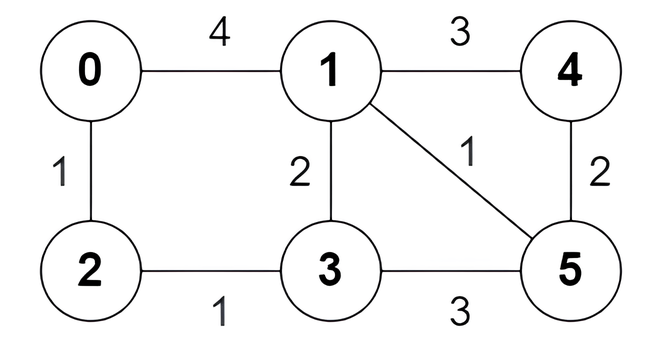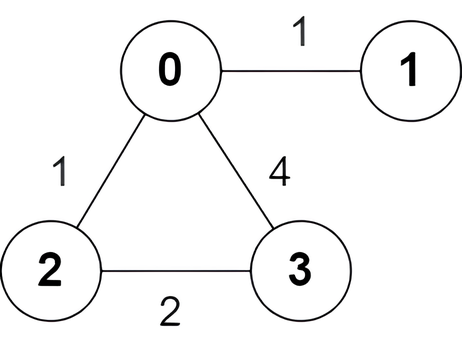LeetCode-in-Java
3123. Find Edges in Shortest Paths
Hard
You are given an undirected weighted graph of n nodes numbered from 0 to n - 1. The graph consists of m edges represented by a 2D array edges, where edges[i] = [ai, bi, wi] indicates that there is an edge between nodes ai and bi with weight wi.
Consider all the shortest paths from node 0 to node n - 1 in the graph. You need to find a boolean array answer where answer[i] is true if the edge edges[i] is part of at least one shortest path. Otherwise, answer[i] is false.
Return the array answer.
Note that the graph may not be connected.
Example 1:

Input: n = 6, edges = [[0,1,4],[0,2,1],[1,3,2],[1,4,3],[1,5,1],[2,3,1],[3,5,3],[4,5,2]]
Output: [true,true,true,false,true,true,true,false]
Explanation:
The following are all the shortest paths between nodes 0 and 5:
- The path
0 -> 1 -> 5: The sum of weights is4 + 1 = 5. - The path
0 -> 2 -> 3 -> 5: The sum of weights is1 + 1 + 3 = 5. - The path
0 -> 2 -> 3 -> 1 -> 5: The sum of weights is1 + 1 + 2 + 1 = 5.
Example 2:

Input: n = 4, edges = [[2,0,1],[0,1,1],[0,3,4],[3,2,2]]
Output: [true,false,false,true]
Explanation:
There is one shortest path between nodes 0 and 3, which is the path 0 -> 2 -> 3 with the sum of weights 1 + 2 = 3.
Constraints:
2 <= n <= 5 * 104m == edges.length1 <= m <= min(5 * 104, n * (n - 1) / 2)0 <= ai, bi < nai != bi1 <= wi <= 105- There are no repeated edges.
Solution
import java.util.Arrays;
import java.util.PriorityQueue;
@SuppressWarnings({"java:S135", "java:S2234"})
public class Solution {
private int[] edge;
private int[] weight;
private int[] next;
private int[] head;
private int index;
private void add(int u, int v, int w) {
edge[index] = v;
weight[index] = w;
next[index] = head[u];
head[u] = index++;
}
public boolean[] findAnswer(int n, int[][] edges) {
int m = edges.length;
edge = new int[m << 1];
weight = new int[m << 1];
next = new int[m << 1];
head = new int[n];
for (int i = 0; i < n; ++i) {
head[i] = -1;
}
index = 0;
for (int[] localEdge : edges) {
int u = localEdge[0];
int v = localEdge[1];
int w = localEdge[2];
add(u, v, w);
add(v, u, w);
}
PriorityQueue<long[]> pq = new PriorityQueue<>((a, b) -> a[1] < b[1] ? -1 : 1);
long[] distances = new long[n];
Arrays.fill(distances, (long) 1e12);
pq.offer(new long[] {0, 0});
distances[0] = 0;
while (!pq.isEmpty()) {
long[] cur = pq.poll();
int u = (int) cur[0];
long distance = cur[1];
if (distance > distances[u]) {
continue;
}
if (u == n - 1) {
break;
}
for (int localIndex = head[u]; localIndex != -1; localIndex = next[localIndex]) {
int v = edge[localIndex];
int w = weight[localIndex];
long newDistance = distance + w;
if (newDistance < distances[v]) {
distances[v] = newDistance;
pq.offer(new long[] {v, newDistance});
}
}
}
boolean[] ans = new boolean[m];
if (distances[n - 1] >= (long) 1e12) {
return ans;
}
dfs(distances, n - 1, -1, ans);
return ans;
}
private void dfs(long[] distances, int u, int pre, boolean[] ans) {
for (int localIndex = head[u]; localIndex != -1; localIndex = next[localIndex]) {
int v = edge[localIndex];
int w = weight[localIndex];
int i = localIndex >> 1;
if (distances[v] + w != distances[u]) {
continue;
}
ans[i] = true;
if (v == pre) {
continue;
}
dfs(distances, v, u, ans);
}
}
}

